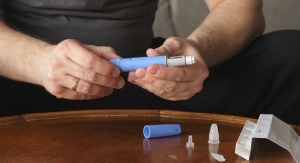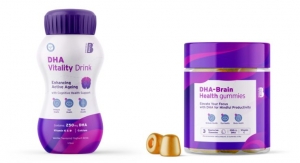Joanna Cosgrove, Online Editor12.17.12
Telomeres are critical, protective components of cell DNA. Much like the plastic tips at the ends of shoelaces, the job of a telomere is to defend against cellular damage. But like those plastic shoelace tips, telomeres are vulnerable to degradation and shortening with age and wear. Ever since their discovery decades ago, researchers have been trying to discover ways to preserve and protect telomeres, because while long telomeres are associated with health and longevity, short telomeres are associated with an increased risk for diseases such as cancer, dementia and diabetes, as well as cardiovascular events.
In a study published in Brain, Behavior, and Immunity, researchers at Ohio State University College of Medicine in Columbus, OH, found omega 3 fatty acid supplements offered a protective effect, slowing the biological process of telomere damage in overweight but healthy middle-aged and older adults who took omega 3 supplements for four months.
“The telomere finding is provocative in that it suggests the possibility that a nutritional supplement might actually make a difference in aging,” said Jan Kiecolt-Glaser, professor of psychiatry and psychology at Ohio State and lead author of the study.
Study participants were dosed with either 2.5 grams or 1.25 grams of active omega 3 polyunsaturated fatty acids. Participants in the placebo group took pills containing a mix of oils representing a typical American’s daily intake.
Dr. Kiecolt-Glaser and her colleagues also reported that omega 3 fatty acid supplements lowered inflammation in this same group of adults. “Inflammation in particular is at the heart of so many health problems. Anything that reduces inflammation has a lot of potentially good spinoffs among older adults,” she said.
The researchers also felt their combination of effects suggested that omega 3 supplements could represent “a rare single nutritional intervention that has potential to lower the risk for a host of diseases associated with aging, such as coronary heart disease, type 2 diabetes, arthritis and Alzheimer’s disease.”
But the crux of the effectiveness is not merely in the supplementation, it’s in the ratio. Martha Belury, professor of human nutrition at Ohio State and a co-author of the study, explained that the ratio of omega 6 to omega 3 fatty acids present in a person’s blood are also important.
The typical American diet tends to be heavy on omega 6 fatty acids (from cooking oils) and comparatively low in omega 3s (from fish). While the ratio of omega 6 to omega 3 fatty acids averages about 15:1, the Ohio State researchers agreed that for maximum benefit, the ratio should be lowered to 4:1, or even 2:1. The long chains, or bigger molecules, that make up EPA and DHA fatty acids are believed to be the secret to their effectiveness, Dr. Belury said.
According to researchers, both groups of participants who took omega 3 supplements showed, on average, lengthening of telomeres compared to overall telomere effects in the placebo group, but the relationship could have been attributed to chance. However, when the researchers analyzed the participants’ omega 6 to omega 3 ratio in relationship to telomere lengthening, a lower ratio was clearly associated with lengthened telomeres.
“The idea we were looking at with the ratio of omega 6 to omega 3 fatty acids was an increase in the denominator to make the ratio smaller,” Dr. Belury said. “In the United States, we need to focus on the omega 3 part because we don’t get enough of those.”
The researchers also examined the role of oxidative stress by measuring F2-isoprostanes levels (compounds that determine levels of oxidative stress), which are linked to a number of conditions, including heart disease and neurodegenerative disorders. Both omega 3 groups together showed an average 15% reduction in oxidative stress compared to effects seen in the placebo group.
Dr. Kiecolt-Glaser said she believed inflammation was driving the changes in telomeres, especially after revisiting earlier inflammation findings. In an earlier paper on omega 3s and inflammation, the researchers reported that omega 3 supplements lowered the inflammatory marker interleukin-6 (IL-6) by 10-12%, depending on the dose. By comparison, those taking a placebo saw an overall 36% increase in IL-6 by the end of the study.
“People who are less healthy than this group, and especially those who experience chronic stress, may gain even more benefits from omega 3 supplementation,” she said.
In unconnected but related news, the increased scientific interest in telomeres has prompted Telome Health, Inc., a Menlo Park, CA-based developer of an existing TeloTest diagnostic test that measures average telomere length, to create a saliva-based TeloTest, which the company intends to launch in the first quarter of 2013. Related telomere tests, including ones that will detail the percentage of short telomeres, will follow, according to the company. This would be the first saliva-based telomere test on the market.
In a study published in Brain, Behavior, and Immunity, researchers at Ohio State University College of Medicine in Columbus, OH, found omega 3 fatty acid supplements offered a protective effect, slowing the biological process of telomere damage in overweight but healthy middle-aged and older adults who took omega 3 supplements for four months.
“The telomere finding is provocative in that it suggests the possibility that a nutritional supplement might actually make a difference in aging,” said Jan Kiecolt-Glaser, professor of psychiatry and psychology at Ohio State and lead author of the study.
Study participants were dosed with either 2.5 grams or 1.25 grams of active omega 3 polyunsaturated fatty acids. Participants in the placebo group took pills containing a mix of oils representing a typical American’s daily intake.
Dr. Kiecolt-Glaser and her colleagues also reported that omega 3 fatty acid supplements lowered inflammation in this same group of adults. “Inflammation in particular is at the heart of so many health problems. Anything that reduces inflammation has a lot of potentially good spinoffs among older adults,” she said.
The researchers also felt their combination of effects suggested that omega 3 supplements could represent “a rare single nutritional intervention that has potential to lower the risk for a host of diseases associated with aging, such as coronary heart disease, type 2 diabetes, arthritis and Alzheimer’s disease.”
But the crux of the effectiveness is not merely in the supplementation, it’s in the ratio. Martha Belury, professor of human nutrition at Ohio State and a co-author of the study, explained that the ratio of omega 6 to omega 3 fatty acids present in a person’s blood are also important.
The typical American diet tends to be heavy on omega 6 fatty acids (from cooking oils) and comparatively low in omega 3s (from fish). While the ratio of omega 6 to omega 3 fatty acids averages about 15:1, the Ohio State researchers agreed that for maximum benefit, the ratio should be lowered to 4:1, or even 2:1. The long chains, or bigger molecules, that make up EPA and DHA fatty acids are believed to be the secret to their effectiveness, Dr. Belury said.
According to researchers, both groups of participants who took omega 3 supplements showed, on average, lengthening of telomeres compared to overall telomere effects in the placebo group, but the relationship could have been attributed to chance. However, when the researchers analyzed the participants’ omega 6 to omega 3 ratio in relationship to telomere lengthening, a lower ratio was clearly associated with lengthened telomeres.
“The idea we were looking at with the ratio of omega 6 to omega 3 fatty acids was an increase in the denominator to make the ratio smaller,” Dr. Belury said. “In the United States, we need to focus on the omega 3 part because we don’t get enough of those.”
The researchers also examined the role of oxidative stress by measuring F2-isoprostanes levels (compounds that determine levels of oxidative stress), which are linked to a number of conditions, including heart disease and neurodegenerative disorders. Both omega 3 groups together showed an average 15% reduction in oxidative stress compared to effects seen in the placebo group.
Dr. Kiecolt-Glaser said she believed inflammation was driving the changes in telomeres, especially after revisiting earlier inflammation findings. In an earlier paper on omega 3s and inflammation, the researchers reported that omega 3 supplements lowered the inflammatory marker interleukin-6 (IL-6) by 10-12%, depending on the dose. By comparison, those taking a placebo saw an overall 36% increase in IL-6 by the end of the study.
“People who are less healthy than this group, and especially those who experience chronic stress, may gain even more benefits from omega 3 supplementation,” she said.
In unconnected but related news, the increased scientific interest in telomeres has prompted Telome Health, Inc., a Menlo Park, CA-based developer of an existing TeloTest diagnostic test that measures average telomere length, to create a saliva-based TeloTest, which the company intends to launch in the first quarter of 2013. Related telomere tests, including ones that will detail the percentage of short telomeres, will follow, according to the company. This would be the first saliva-based telomere test on the market.



























